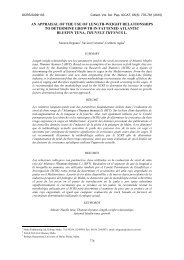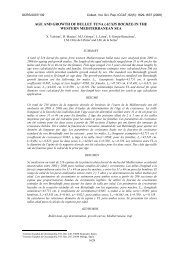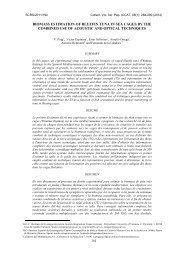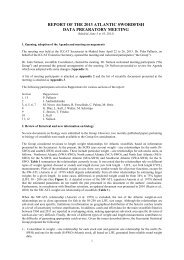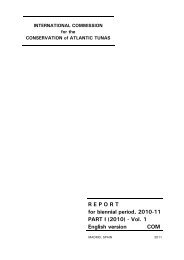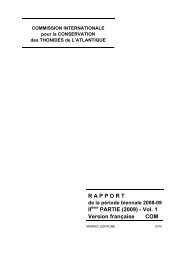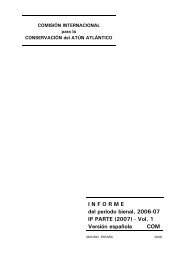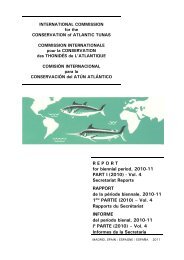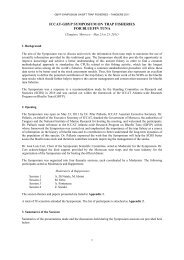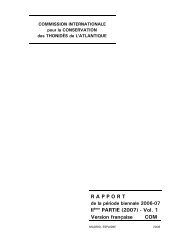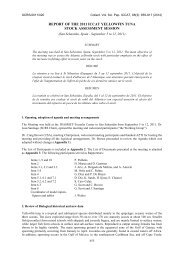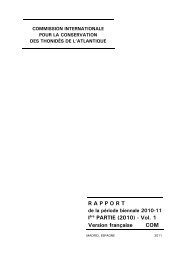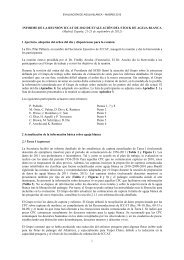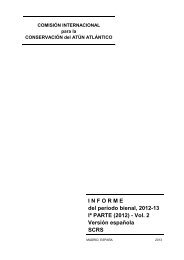E - Iccat
E - Iccat
E - Iccat
Create successful ePaper yourself
Turn your PDF publications into a flip-book with our unique Google optimized e-Paper software.
ICCAT REPORT 2002-2003 (II)<br />
As a coastal developing State with a long historical catch and as a country with spawning areas and habitats of<br />
bluefin tuna in her waters, Turkey warrants special recognition.<br />
The needs of the coastal States whose economies are dependent on the exploitation of marine resources in the<br />
eastern Mediterranean Sea were not taken into consideration.<br />
Since 1992 Turkey has been carrying out research on tunas in Turkish waters and is documenting new scientific<br />
results for bluefin tuna fisheries. With that, Turkey has provided the basis for the management and conservation<br />
of highly migratory species.<br />
The delegation of Turkey would like to thank the Chairman, the organizers and all of the participants of the<br />
Eighteenth Regular Meeting of the Commission for their efforts.<br />
We would also like to thank the Irish Government and the EC for giving us the opportunity to hold this meeting<br />
in this wonderful city of Dublin.<br />
United Kingdom (in respect of its Overseas Territories)<br />
The United Kingdom (in respect of its Overseas Territories) participating in ICCAT would like to thank the Irish<br />
Government for hosting the 18th Regular Meeting of ICCAT. We would also like to extend out thanks to the<br />
ICCAT Secretariat for its hard work in preparing this meeting.<br />
The United Kingdom represents six Overseas Territories at ICCAT: Anguilla, Bermuda, the British Virgin<br />
Islands, the Falkland Islands, St. Helena and its dependencies Tristan da Cunha and Ascension Islands, and the<br />
Turks and Caicos Islands.<br />
We continue to be concerned about the effect of IUU fishing on the stocks managed by ICCAT, especially at it<br />
affects our Overseas Territories, and so we welcome the positive outcome of the working groups on measures to<br />
combat IUU fishing. We hope that this meeting will take forward that work and thereby provide ICCAT parties<br />
with a set of tools to combat IUU fishing as web as fishing in contravention of ICCAT conservation and<br />
management measures.<br />
It is essential that we act in a responsible way to safeguard the stocks managed by ICCAT. We should ensure<br />
that total allocations are set in accordance with the precautionary principle and area based on the best scientific<br />
advice available.<br />
We look forward to participating in discussions over the coming web and hope that all parties present are able to<br />
work together constructively to ensure ICCAT´s continued success.<br />
United States<br />
It is a pleasure to be in Dublin for the 18 th Regular Meeting of the Commission. The members of ICCAT are<br />
facing many complex and challenging issues. As in previous years, we can work together to advance the<br />
conservation of ICCAT species. The U.S. priorities for this year’s meeting reflect several guiding principles.<br />
First, we are committed to rebuilding over-fished species. The recovery of North Atlantic swordfish is a clear<br />
example of how we can work cooperatively to take responsible actions that enable an over-fished stock to<br />
rebuild to the biomass supporting the maximum sustainable yield (MSY). Our second guiding principle is to<br />
pursue effective monitoring and reporting, as well as compliance by ICCAT members with the Commission’s<br />
binding recommendations. Finally, we must continue moving forward to address non-member fishing that<br />
threatens our shared fishery resources.<br />
Despite our differing domestic priorities, while here at ICCAT we should all keep in mind the primary objective<br />
of the Convention: to manage ICCAT stocks at levels that will support the MSY. Stock management issues of<br />
primary importance this year include new measures for bigeye tuna and albacore. The United States supports the<br />
development of multi-year measures with total allowable catches that, for bigeye tuna and South Atlantic<br />
albacore, will limit fishing mortality to levels that will support MSY, and for North Atlantic albacore, will<br />
rebuild the stock to MSY levels, while maintaining flexibility for small harvesters.<br />
64



